Jan 24, 2024 | Editors' Blog, Interviews
Today, we’re talking with Keith Yocum, about his book Dead In The Water (A Cape Cod Mystery Book 2).
Tell us something unexpected about yourself!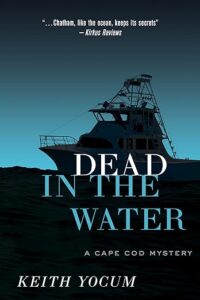
In high school I represented Western Australia in the Australian Under-16 Rugby Union Tournament held in Tasmania. We got thoroughly trounced by the New South Wales teams, but we won the prize for brashness, mate.
Why do you write?
As a former journalist, I've been writing for a long time and love every part of it. Except the editing. And the re-writing. Every morning before I start composing, I hand-wind my Scottish-Australian grandfather's 100-year-old pocket watch as a reminder of the wonderful people who've made my life so meaningful.
Where did you get the inspiration for your current book?
Cape Cod is a magnificent peninsula shaped like a bent elbow. It juts 30 miles into the Atlantic Ocean and is full of interesting people, places, and things. There are undercurrents of tension lurking below the surface here, and I enjoy poking and prodding the social and demographic terrain.
What do you enjoy the most about your genre?
Mysteries are endlessly fascinating, with layer upon layer of complexity, including the human tendency to do bad things.
How would you describe your writing process?
I typically start with an outline of the main plot points and let the story tell itself. Over the years, I've developed a bad habit of waking up in the wee hours and ruminating about a plot problem that needs to be resolved. This invariably leads to lost sleep and more plot problems that need more rumination to solve.
What do you think authors have to gain from participating in social media?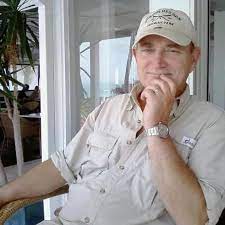
Readers have a desire to interact with authors. They're curious about how authors develop stories and what their motivations are. This is healthy and a reasonable request. Many authors simply want to write and turn it over to the publisher to promote. Alas, those days are gone, and social media is a necessary part of an author's platform.
What advice would you have for other writers?
If the goal for an author is simply to tell a story, then write what moves you. If the author wants to generate a larger cache of readers, they have to pay some attention to what moves the reader. It's one way or the other.
How do you select your books’ titles and covers?
For covers, I usually send out three examples to my email list and ask for their advice. For titles, I work with my trusted adviser who is my wife and is never wrong on this subject.
What's your next step?
I have two books mapped out and need to do a little more on-the-ground research. Then it's back to pounding the keyboard and waking up in the middle of the night…
What book do you wish you had written?
All The Pretty Horses by Cormac McCarthy.
How do you react to seeing a new review for your book?
If it's a good review, I'm pretty happy. If it's a bad review, I try to decide if the criticism is valid. If it's valid, I pay attention to its message. If it's not valid, I move on. I'm still glad they gave my book a read.
VISIT KEITH'S WEBSITE
FIND KEITH'S BOOK ON AMAZON
Jan 24, 2024 | Editors' Blog, Interviews
Today, we’re talking with Kirk Galbraith, about his book The Art of Conspiracy: Hidden in Plain Sight.
Tell us something unexpected about yourself!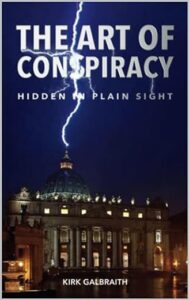
I am an avid golfer with a 5 handicap working on getting to scratch ie: 0. My lowest score is 71 so trying to break 70.
Why do you write?
I find it difficult to share my topics with most people in public so I decided to put it all down in The Art of Conspiracy: Hidden in Plain Sight. The idea was to help those who can sense that some things are not right with the world and are interested in connecting the dots.
Where did you get the inspiration for your current book?
I have researched secret societies and ruling families for 40 years.
What do you enjoy the most about your genre?
Once you get past the anger and grief stages of learning about the control systems of our world it is a fascinating study that never ceases to amaze me.
How would you describe your writing process?
I prefer to write in the morning and compile different topics for the outline. Then start to organize the topics into chapters and start writing. The chapters get rearranged as I write and see how it comes together.
What do you think authors have to gain from participating in social media?
This is an area where I am not very strong although I see the benefit to those who enjoy it and use it well to gain more eyes on their books.
What advice would you have for other writers?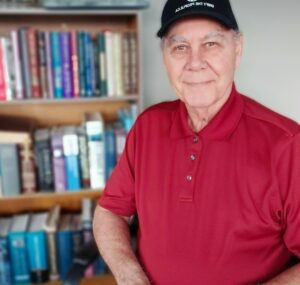
I had a writing partner and we met on zoom every Wednesday morning. This buddy system really helped when either of us was stuck or just needed some encouragement. It took us about 5 months to write our books.
How do you select your books’ titles and covers?
I sent about 30 different titles to my email list and asked them to choose their top 3, after which I was able to pick mine. This was suggested in a course I took from my Publisher Matt Rudnitsky. The cover I chose after looking through Google Images.
What's your next step?
Writing my next books with the Twins training.
What book do you wish you had written?
I recently stumbled across the Mikkelsen twins who have taken their book writing to a million dollar business and were listed on Forbes 500. So, I am taking their 7 day challenge starting Monday January 22nd and will probably write a cookbook or activity book as their course suggests, but write it under a pen name, as it is a departure from my genre.
How do you react to seeing a new review for your book?
Love it! Only wish there were more as I know I need 50 to 100 for the Amazon algorithms to promote it.
FIND KIRK'S BOOK ON AMAZON
Jan 23, 2024 | Editors' Blog, Interviews
Today, we’re talking with Paul F. Marzell, about his book Heimat.
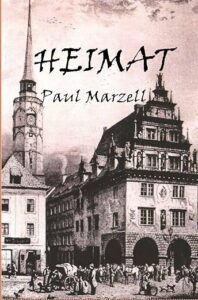 Tell us something unexpected about yourself!
Tell us something unexpected about yourself!
Judging from the reaction from close friends and family, it is the disbelief that I could write a novel, especially a novel that could classify as an epic saga.
Why do you write?
Heimat is my first novel, and I wrote it because many novels by best-sellers are poorly written or not thoroughly researched. I felt that I could do better. It was not until I developed the totally fictitious characters in Heimat that I could generate countless scenarios, plots, and characters. I found it to be scary. The challenge lies in translating these thoughts from my mind to either paper or a hard drive. I want to keep trying.
Where did you get the inspiration for your current book?
The inspiration for writing “Heimat” struck me eleven years ago when researching my family tree in anticipation of my first grandchild's birth. My goal was to compile a comprehensive documentation of his diverse heritage, spanning Dutch, English, Mexican, and German roots. Employing traditional resources like census and baptismal records, I augmented my project with invaluable documents inherited from my father, who immigrated from Germany in 1929.
Among these documents were my father’s birth certificate, immigration papers, passport, the ticket for the inaugural voyage of the TS Bremen across the Atlantic, and a collection of various German and United States government forms, including his World War Two draft registration. The letters he preserved from his mother, sisters, and other relatives, which he received both before and after World War Two, were of utmost significance.
Many of the letters were composed in Sütterlin Schrift, a script no longer taught in Germany. It took me several months to transcribe them into modern German script and then translate them into English.
Many of the experiences of some characters in Heimat are inspired by real-life experiences of people I know. At the same time, I've crafted other characters and their experiences entirely from my imagination. In the chapters where letters are utilized for foreshadowing, some are nearly verbatim from authentic letters, while others are consolidations of two or more correspondences. Additionally, there are instances where letters are entirely fictional. These letters not only served to establish the chronological framework for the narrative but also became an integral part of the storytelling.
Despite these creative liberties, the historical facts presented in my work are meticulously researched and accurate.
What do you enjoy the most about your genre?
Some of the story is already written. All the writer needs to do is make it interesting with a twist while still maintaining the integrity of the past.
How would you describe your writing process?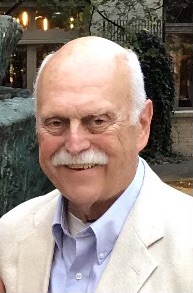
Plodding and cumbersome. I can't type worth a damn, and I am easily distracted.
What do you think authors have to gain from participating in social media?
The skill to manage it effectively, and generate an interested following.
What advice would you have for other writers?
Do not be easily distracted like I am. While writing, do your best to ignore all chores, e.g. cleaning up the dog poop, mowing the lawn, fixing the leaking toilet, staining the deck, ad infinitum. Learn to type! I’m too old to learn that trick. Do not ignore your health!
How do you select your books’ titles and covers?
I never buy a novel by its cover or title. I read the synopsis to see if there is anything of interest.
What's your next step?
To get beyond the first two chapters of my next novel, which I have been writing for the past four months.
What book do you wish you had written?
Anything written by J.K. Rowling or R. R. Tolkien. Their minds are or were wild and they possessed the magic to get their thoughts from their minds to paper.
How do you react to seeing a new review for your book?
Obviously, I feel great if it's good, but if it is not, I am grateful if the review has honest, constructive criticism.
FIND PAUL'S BOOK ON AMAZON
VISIT PAUL'S WEBSITE
Jan 23, 2024 | Editors' Blog, Interviews
Today, we’re talking with Tiffany Davenport, about her book Bottoms Up.
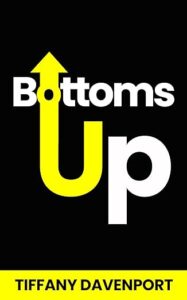 Tell us something unexpected about yourself!
Tell us something unexpected about yourself!
I think readers will be suprised to learn that I am a sober alcoholic and that I really struggled with additction in my 20's.
Why do you write?
Writing allows me to express my thoughts and feelings. It's a creative outlet for me.
Where did you get the inspiration for your current book?
I lived it! My book is a memoir about my life experiences with addiction, grief and trauma.
What do you enjoy the most about your genre?
I love the opportunity to be vulnerable and deeply honest even though it's a little scary to put myself out there.
How would you describe your writing process?
I very much work in stream of consciousness first and write whatever comes to mind. I later go back and revise and rework my writing.
What do you think authors have to gain from participating in social media?
Social media is a great way to personally connect with readers and allow them to get to know you, the author.
What advice would you have for other writers?
Just get started! Don't worry about crafting the perfect story at first. Just get your thoughts down on paper.
How do you select your books’ titles and covers?
Bottoms Up came to me when I was thinking of common drinking phrases and their meanings. My story is very much the journey to and from rock bottom, so it seemed fitting. I wanted the cover to be simple yet intriguing to readers.
What's your next step?
My next step is to continue to blog and start a podcast this year.
FIND TIFFANY'S BOOK ON AMAZON
Jan 23, 2024 | Editors' Blog, Interviews
Today, we’re talking with Matt Armstrong, about his book In Like Lloyd: An Urban Fantasy Mystery (Noctis Investigations Book 1).
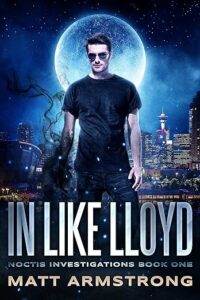
Tell us something unexpected about yourself!
I'm forklift certified.
Why do you write?
I love telling stories, and enjoy seeing reactions to the things I've come up with. I enjoy making people laugh and think about things in different ways. I love inspiring and entertaining, but at the end of the day, my writing is for me first and foremost. Even if I never sold a single copy, I'd remain content that I wrote it, and hold it close to my heart for the rest of my life.
Where did you get the inspiration for your current book?
Originally, I'd say Robert Jordan, Robin Hobb, Terry Brooks and Terry Goodkind. They inspired me to write my own fantasy epic when I was a teenager, but I hated it and never moved forward with it.Then I found the likes of Neil Gaiman and Terry Pratchet (lots of Terrys in Fantasy) and loved the blending of humour into darker themes. When I discovered Jim Butcher, Urban Fantasy quickly developed into my favourite genre, and Lloyd Gibson began taking shape in my head.
What do you enjoy the most about your genre?
You can do literally anything you want, especially when you add science fiction elements into the story. If I decided a 50 foot tall giant would climb out of the Earth and use the Calgary Tower as a baseball bat to fight an alien menace, I could make it fit within my narrative. It also gives me the ability to use real-world references, which help readers, and myself, relate to my characters.
How would you describe your writing process?
Literally by the seat of my pants, and I try to write as raw as possible. Get the story out, and not get bogged down with how to phrase things, which dialog tags to use, or “What are Lloyd's hands doing right now?” Those are all things left for the touch-ups and edits. Get what I want written down, and clean it up later. I don't like storyboards and thousands of notes. They work great for a lot of authors, but I only end up staring at them, overthinking, and not writing.
I begin each book with an idea, a concept, and just sit down and start. 70% of what I end up writing wasn't even a part of the initial plan, and just came out of me in the moment. If I'm not sure where to go next, or how to lead into the next idea, I just send Lloyd out into the world and see what happens. I often write my characters into corners with no preceivable way out, but it forces me to find one, and make it believable. I'm constantly challenging myself this way, and it's led to things I'm very proud of.
There have been many times I started a chapter, knowing for sure what I was going to write, and ended up with something completely different. I love it that way, because how will my readers predict what will happen when I don't even know?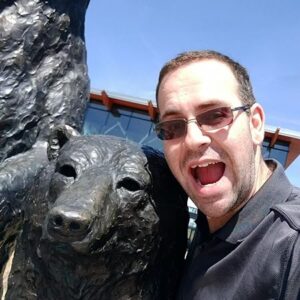
What do you think authors have to gain from participating in social media?
The ability to reach a wider audience, and a series of headaches. I'm honestly terrible at social media, but I'm working on it. It's never been a large part of my life, and entering it now is a daunting task.
What advice would you have for other writers?
Take your inspirations, but leave them as inspiration only. Write your stories for yourself, first and foremost, and worry about target audiences after. Don't strive to become the next Stephen King. Strive to become the first YOU.
How do you select your books’ titles and covers?
The titles are either very easy or very difficult. Every title is a play on a specific phrase, and finding what works with each book is harder than you'd think. “In Like Lloyd” came to me immediately, but “A Matter of Lloyd and Death” started out as “In The Shadow Of Lloyd”, and kept that title for most of its pre-release existence. I honestly only changed it because a future book demanded a similar title. I consider the themes of each book, find a phrase that fits, and roll with it. My favourite is book 3, “When Lloyds Collide”, because it fits with four different themes happening in that story.
As for the covers, I put my trust in my designers. I give them the basics (location, season, etc) and a list of ideas, and see what comes out. They use stock photos, so we're limited in what we can do, but I'm quite happy and impressed with what they've given me.
What's your next step?
Keep writing, keep self-publishing. Book 3 is available at this moment for pre-order, and I'm busy working away on cleaning up book 4. Lloyd's story is far from over.
What book do you wish you had written?
The honest answer? None. I've never been an envious person. I don't wish other people's works were my own. Instead, I'd rather strive to become their equal, and get people talking about my own work at the same level as theirs.
The cheeky answer? Twilight, because I'd be rich now. If I were making that kind of money, then maybe I could afford half a house in today's market.
How do you react to seeing a new review for your book?
I grin like a fool and desperately wish I could have a full conversation with the people who write them. I love talking about my work, and could do it for hours.
FIND MATT'S BOOK ON AMAZON
Jan 23, 2024 | Editors' Blog, Interviews
Today, we’re talking with Mike Weedall, about his book War Angel: Korea 1950.
Tell us something unexpected about yourself!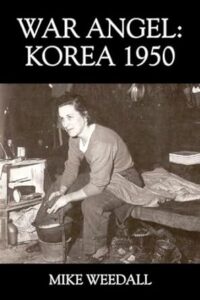
I worked for thirty-plus years promoting energy efficiency. With the programs I managed and was involved in, the amount of electricity we reduced meant four power plants weren't built.
Why do you write?
Digging into the fascinating stories of individuals in history has been a passion of mine all my life. Getting the chance now to discover and write about courageous and fascinating people is a dream come true.
Where did you get the inspiration for your current book?
I love to discover people who did amazing things, but never have gotten recognition. The women of the US Army who served in the Korean War did so when regulations prohibited men from serving in that function. Being right behind the frontline fighting and dealing with horrific combat wounds in selfless service is a story more people should know about.
What do you enjoy the most about your genre?
The stories never cease to amaze me. E-mail me, and I'll share a few that you'll shake your head at.
How would you describe your writing process?
It's hard. I usually have far too much material to make a book pace well. I hate to look at what I leave on the cutting room floor.
What do you think authors have to gain from participating in social media?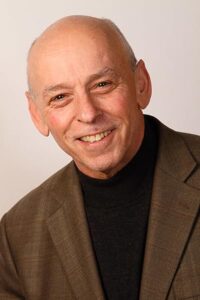
Sharing the stories other people would never have discovered on their own.
What advice would you have for other writers?
Hang in there. It's hard working alone, but when you get to reading how readers love what you've done, it's all worthwhile.
How do you select your books’ titles and covers?
I work with a professional. I want to ensure that the prospective reader sees a vision of what is between the covers. For example, with my current book “War Angel: Korea 1950,” look at the conditions that nurse must put up with. And that's her downtime that might have followed ten-plus hours of surgeries.
What's your next step?
Check out the term “Maroons” in Wikipedia. The largest one in North America was in The Great Dismal Swamp. The story of the brave fugitive slaves who lived there is my next book.
What book do you wish you had written?
David McCullough's “Truman,” or any of McCullough's books. The way he gets inside the heads of his characters is fascinating.
How do you react to seeing a new review for your book?
They have typically been good, so it's usually a positive for me. When I do see the occasional negative review, I have to resist wanting to explain to the reviewer what they missed. Instead, I have to take the negative and learn from it.
VISIT MIKE'S WEBSITE
FIND MIKE'S BOOK





 Tell us something unexpected about yourself!
Tell us something unexpected about yourself!
 Tell us something unexpected about yourself!
Tell us something unexpected about yourself!





